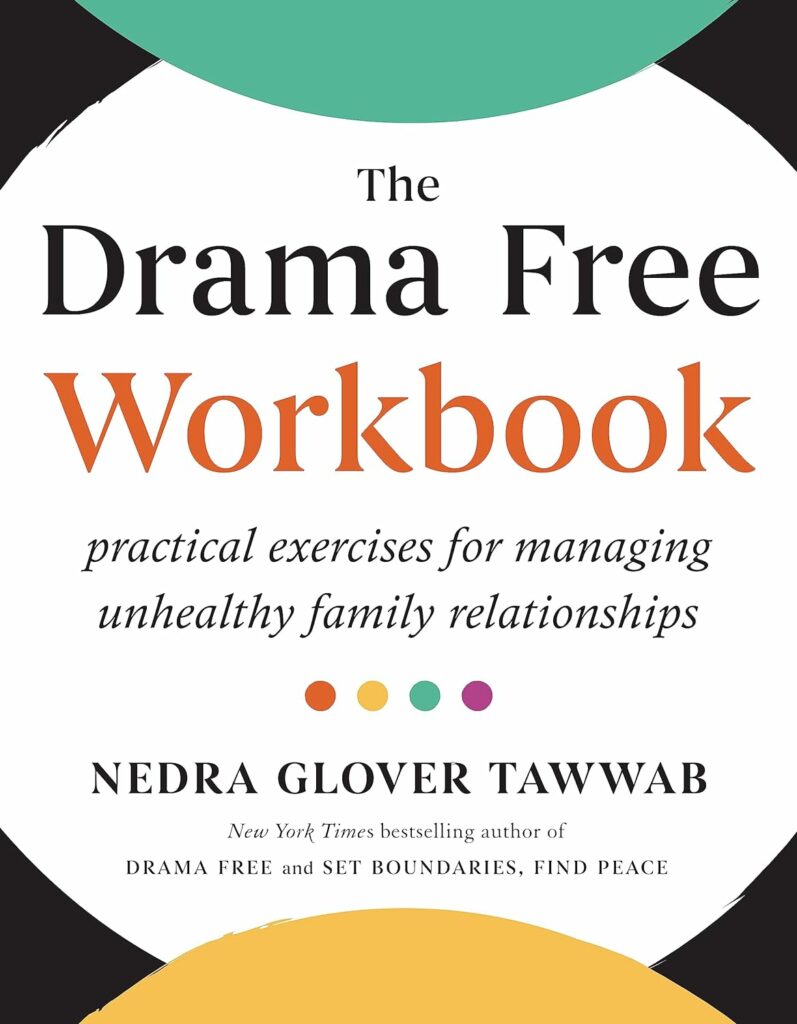With Insights From Nedra Glover Tawwab
Written by The Bene Team
In a recent episode of the Do Tell Relationship Podcast, therapist and Social Worker Nedra Glover and LMFT Nina Westbrook shared invaluable insights on managing family dynamics and fostering healthier relationships. The episode titled “Drama Free: Insights from Nedra Glover Tawwab” provided a comprehensive exploration of practical strategies for navigating conflicts, establishing boundaries, and prioritizing self-care within family contexts.
Nedra, drawing from her extensive therapeutic background, emphasized the significance of embracing realistic expectations in understanding family dynamics. Through her years of experience, she highlighted the commonality of conflicts within families and advocated for approaching such challenges with acceptance and resilience. By acknowledging the imperfections inherent in familial relationships, individuals can navigate through familial tensions with greater ease and emotional fortitude.
"I think setting boundaries as scrambling an egg, not everybody gets it right. Seems very simple, right? You crack the egg, either you whip it up in a bowl or you stir it a lot in a pan, and then sometimes people just don't make good eggs. So it's one of those things that we have to practice to get better at and it's going to be unique for our experience."
—Nedra Glover Tawwab
Echoing Nedra’s sentiments, Nina underscored the importance of prioritizing self-care amidst familial challenges. Recognizing the toll that family dynamics can take on one’s well-being, she emphasized the need for individuals to carve out time for activities that nourish the mind, body, and spirit. By prioritizing self-care, individuals can approach familial interactions from a place of emotional balance and stability, thereby mitigating the impact of familial tensions on their mental health.
Throughout the episode, Nedra and Nina shared a wealth of practical tips and strategies for managing conflicts, identifying triggers, and establishing healthy boundaries within familial relationships. They emphasized the significance of effective communication, empathy, and understanding in fostering positive familial dynamics. By incorporating these insights into their daily lives, listeners were encouraged to cultivate healthier and more fulfilling relationships within their families.
You can tune in below to listen to the full episode. ⤵︎


The complexities of family dynamics were portrayed as a complex system with the threads of tradition, personality quirks, and unique relationships. From navigating deeply rooted traditions to managing occasional conflicts, every family experiences its own set of challenges and joys. However, the pressure to achieve an unrealistic standard of familial harmony can often overshadow the reality that familial tensions and conflicts are a normal part of life.
The engaging conversations between relationship experts Nina Westbrook and Nedra Glover on the “Do Tell Relationship Podcast” provided listeners with invaluable perspectives on setting healthy boundaries, understanding emotional intelligence, and coping with difficult familial relationships. Through candid discussions, the experts offered actionable advice and real-life examples to empower listeners in navigating the complexities of familial dynamics with confidence.
Nina and Nedra’s exchange offered a glimpse into the world of therapy and relationship dynamics, touching on various aspects of personal growth and self-awareness. From discussing the challenges of practicing therapy to exploring the nuances of setting boundaries, their conversations shed light on the intricacies of human behavior and interpersonal relationships.

Whether listeners had the opportunity to tune into the episode or not, the key takeaways and strategies outlined in the discussion are broken down for further exploration below. The concept of emotional intelligence and its profound impact on fostering empathy, understanding, and resilience in familial relationships was explored in depth. By honing their emotional intelligence, individuals are encouraged to equip themselves with the necessary tools to navigate conflicts, set healthy boundaries, and cultivate meaningful connections with their family members.
Practical tips for maintaining boundaries and coping with difficult familial situations were the key focus. Whether it’s managing conflicts with family members or navigating challenging dynamics in the workplace, the below tips offer valuable strategies for maintaining inner peace and harmony amidst life’s inevitable storms.
Below you will find our evidence-based strategies to navigate through the complexities of family dynamics. From embracing realistic expectations to prioritizing self-care, and from identifying triggers to establishing healthy boundaries, each strategy is designed to empower individuals in fostering healthier and more fulfilling relationships within their family unit. By incorporating these strategies into our lives, we can navigate through family drama with greater ease, fostering deeper connections and cultivating a sense of harmony amidst the inevitable ups and downs of familial relationships.
Practical Strategies for Dealing with Family Drama
1. Embrace Realistic Expectations:
Setting realistic expectations is essential for maintaining emotional balance and resilience in the face of family dynamics. Recognize that you cannot control the actions or behaviors of others, but you can control how you respond to them. Rather than expecting perfection, anticipate common patterns or triggers that may arise during family interactions. By adjusting your expectations, you can approach family gatherings with a sense of preparedness and adaptability.
2. Prioritize Self-Care:
Prioritizing self-care is paramount for preserving your mental and emotional well-being amidst family drama. Before attending family events, carve out time for activities that nourish your mind, body, and spirit. Whether it’s practicing mindfulness, engaging in physical exercise, or indulging in creative pursuits, investing in self-care rituals can help you navigate through family dynamics with greater resilience and grace.
3. Identify and Manage Triggers:
Understanding your emotional triggers is key to effectively managing family conflicts. Take time to reflect on past experiences and identify specific topics or situations that evoke strong emotional responses. Once you’ve identified your triggers, develop strategies for managing them, such as practicing deep breathing exercises or reframing negative thoughts. By proactively addressing your triggers, you can maintain emotional equilibrium and respond to family drama with greater clarity and composure.
4. Choose Your Battles Wisely:
Not every disagreement requires a response, and engaging in unnecessary conflicts can exacerbate tensions within the family. Instead of reacting impulsively, carefully consider whether a particular issue is worth addressing. Focus on maintaining healthy boundaries and expressing your perspective assertively yet respectfully when necessary. By exercising discernment and restraint, you can avoid unnecessary conflicts and preserve the overall harmony within your family.
5. Establish Healthy Boundaries:
Establishing healthy boundaries is essential for protecting your emotional well-being and maintaining healthy relationships with family members. Clearly communicate your boundaries and limits in a respectful and assertive manner. Whether it’s setting limits on intrusive questions or establishing guidelines for respectful communication, prioritize your needs and boundaries without guilt or hesitation. Remember that self-care includes knowing when to step back from toxic dynamics for your own sake.
6. Cultivate Empathy and Understanding:
Practicing empathy and understanding towards family members can help foster deeper connections and alleviate tensions within the family. Recognize that each family member has their own unique perspectives, experiences, and challenges. Seek to understand their motivations and emotions without judgment or criticism. By cultivating empathy and compassion, you can foster a supportive and nurturing family environment where individuals feel valued and understood.
"So there are certain people where you may need to say, it will be really sad to not have this relationship, I don't know, say with your dad, but is it possible that it could also be something that enhances your life? That's the thing that we don't think about, that the stress of the relationship sometimes is so overwhelming."
—Nedra Glover Tawwab
Additional Strategies for Managing Family Dynamics
7. Communication Skills:
Effective communication is the cornerstone of healthy family relationships. Practice active listening, where you give your full attention to the speaker without interrupting or judging. Validate the feelings of others and express your own thoughts and emotions in a clear and respectful manner. Avoid making assumptions and be open to constructive feedback from family members.
8. Conflict Resolution:
Conflicts are inevitable in any family, but how they are resolved can determine the overall health of the relationships. When conflicts arise, focus on finding mutually acceptable solutions rather than assigning blame or escalating the situation. Use “I” statements to express your feelings and concerns without placing blame on others. Seek compromise and be willing to apologize and forgive when necessary to maintain harmony within the family.
9. Family Meetings:
Regular family meetings can provide a structured forum for addressing issues, sharing concerns, and making decisions collectively. Set aside time for family meetings where everyone has the opportunity to express themselves and contribute to the discussion. Create an agenda beforehand to ensure that important topics are addressed, and establish ground rules for respectful communication and participation.
10. Quality Time Together:
Spending quality time together as a family can strengthen bonds and foster a sense of belonging and connection. Plan regular activities or outings that allow family members to bond and create lasting memories together. Whether it’s a family movie night, a weekend hike, or a shared meal, prioritize meaningful interactions that nurture positive relationships and create cherished memories.
Insights from Therapist and Social Worker Nedra Glover and Licensed Marriage and Family Therapist Nina Westbrook
With insights from therapists Nedra Glover and Nina Westbrook, listeners were reminded that while familial relationships can be challenging, they also offer immense potential for cultivating healthier and more fulfilling connections. At the core of navigating familial dynamics lay the art of prioritization, as eloquently articulated by Nedra. Faith and family often reigned supreme on her priority list, followed closely by other aspects of life that may ebb and flow in importance. Recognizing that different facets of life may require varying degrees of attention at different times was key to finding balance amidst the whirlwind of familial drama.
Moreover, self-care emerged as a crucial component of this journey. As Nedra shared, finding moments of solace in simple pleasures like watching TV, connecting with loved ones, or pursuing new hobbies could be immensely restorative. It was about carving out time to prioritize one’s own well-being amidst the demands of family life—a practice that was essential for maintaining peace and equilibrium.
By incorporating the practical exercises from Nedra’s “Drama Free” workbook, individuals were empowered to apply these insights in their own lives. The workbook served as a roadmap for navigating through family dynamics, offering tangible strategies for fostering empathy, setting boundaries, and cultivating healthier communication patterns.
As you navigate the intricacies of family dynamics, we encourage you to seek guidance and inspiration from various sources. Other resources offered by Bene By Nina include the Bene is the Bene Podcast of Mindful Mental Health Moments, and Nina’s Wellness Workshops. Nina Westbrook’s captivating podcast, “Do Tell Relationship Podcast” offers invaluable insights into navigating relationships with grace, compassion, and authenticity. Whether grappling with communication challenges, setting boundaries, or seeking to deepen connections with loved ones, Nina’s podcast provided a holistic and down to earth wealth of wisdom and practical advice.


Purchase for $17.59 on Amazon
In essence, living a happy life amidst family drama entailed cherishing moments of laughter, fostering meaningful connections, and embracing the journey with an open heart. It was about finding joy in the midst of chaos and cultivating resilience in the face of adversity. Through prioritization, self-care, and empathy, individuals could navigate through the twists and turns of family dynamics with grace and authenticity, ultimately forging deeper connections and fostering a sense of harmony within their families.
Until next time, listeners were encouraged to continue to Live Bene!
KEY TAKEAWAYS
Practical Strategies for Dealing with Family Drama
- Embrace Realistic Expectations:
- Control what you can: Your Response
- Expect patterns, not perfection
- Prioritize Self-Care:
- Nourish Mind, Body, Spirit: Mindfulness, Exercise, Creativity
- Identify and Manage Triggers:
- Know your triggers: Reflect on past experiences
- Manage them: Deep breathing, Reframe thoughts
- Choose Your Battles Wisely:
- Consider: Is it worth it?
- Maintain Healthy Boundaries: Assertive yet respectful
- Establish Healthy Boundaries:
- Communicate: Respectful and assertive
- Prioritize Self-Care: Step back when necessary
- Cultivate Empathy and Understanding:
- Understand Perspectives: Unique experiences and challenges
- Foster Connection: Empathy and compassion
